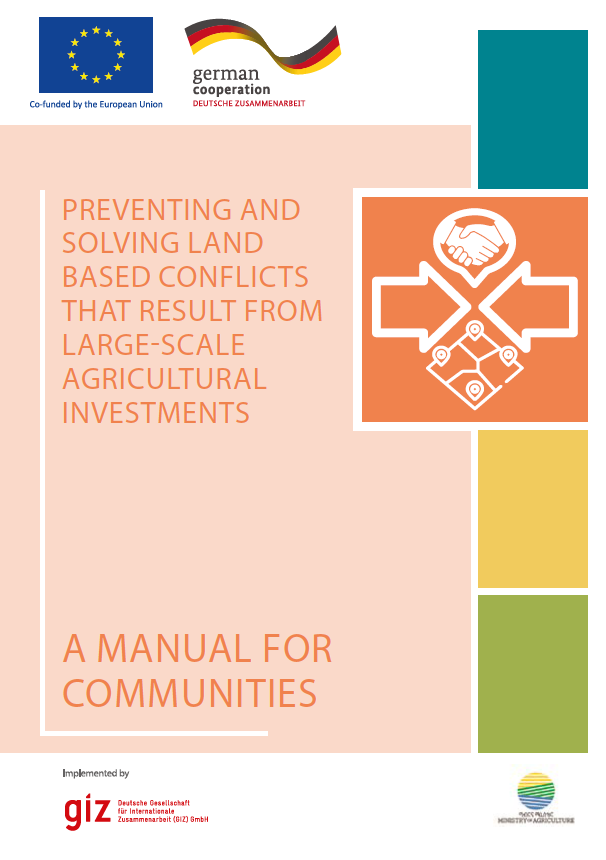Building innovative methodologies to overcome conflict and tension requires to go and work there where it is hardest. ProPFR Côte d’Ivoire (Promotion d’une Politique Foncière Rurale – Global Programme for Responsible Land Policy) tested approaches in Cavally region to help overcome significant opposition to change.
Securing land tenure and land use rights is fundamental for improving social cohesion in rural social landscapes riddled with conflict. As established by the VGGT, migrant communities tend to be especially vulnerable to informal tenure agreements. Sustainable conflict resolution requires participatory negotiation of long-term use agreements and the establishment of conflict resolution mechanisms. To meet national targets and successfully implement the ambitious national land tenure security program of Côte d’Ivoire’s Rural Land Tenure Agency (Agence Foncier Rurale - AFOR), communities must be involved, and discrimination against migrant communities must be prevented. In 15 villages of the Cavally region of South-West Côte d’Ivoire, ProPFR implements land (use) right clarification and documentation activities as part of a partnership with 8 cocoa multinationals. In 2023, operations to solve conflicts and tensions between autochthone and migrant populations were proceeding normally, when a group of national leaders from one ethnic group gridlocked the activities. They objected to the official interpretation of the law promulgated by AFOR and claimed that only natives have a right to land, echoing discriminatory messages from Côte d’Ivoire’s dark past of civil war, and preventing sustainable investments.

Launch event of AFOR’s 200M$ World-Bank-funded program. CC@ProPFR Côte d'Ivoire/GIZ.
From before decolonisation, cocoa and other crops have been ‘eating up’ Côte d’Ivoire’s rainforests. The first president actively invited migrants to clear the forest for agricultural development. Autochthone customary landowners were instructed to welcome them with open arms. Generations later, land and forests have run out and tension over land rise rapidly. Law reforms make it possible for non-Ivorians to own land, but this can reopen old wounds, especially when migrants today disrespect their ‘tuteurs’ by not recognizing the ‘gift’ or ‘sale’ (or was it?) that their parents received. AFOR in its programs had not dared to work in this last cocoa frontier yet but has been keen to officially adopt most of ProPFR’s methodological innovations.
“If we are to ensure rural land tenure security, then we must build and foster harmony among communities and lay the foundations for lasting peace throughout the country.”
- Kouadio Konan Bertin, Minister of Agriculture, Rural Development, and Food Production
 Woman from Cavally Region holding up her Land Use Agreement. CC@ProPFR Côte d'Ivoire/GIZ.
Woman from Cavally Region holding up her Land Use Agreement. CC@ProPFR Côte d'Ivoire/GIZ.
The ethnic leaders created a committee and campaigned in the project area. Faced with this situation, ProPFR contacted the regional and national administrative authorities and garnered support from the ministry and the World Bank (main donor of AFOR), to help resolve this and force an official stance in the interest of achieving the freshly adopted national land tenure strategy. A national workshop with the committee followed, where AFOR’s Director General presented ProPFR’s public-private partnership as its own project. Information workshops on land tenure security procedures and social cohesion were held in the sub-prefectures, chaired by the sub-prefects.
ProPFR’s experience with alternative dispute resolution and assistance in negotiations with local authorities has enabled communities to overcome long held prejudice against migrant access to land, and land use agreements and land contracts were issued in the respective villages. Operations have started to show results again, though the situation remains complex. A core lesson is to always refer to the authorities, and work toward legally correct and mediated solutions that can be applied locally. In one reticent village territory, after holding various discussion, we asked the sub-prefect to return to the village after the workshop and mediate. The same day we were able to register 20 applications for land certificates. The village chief changed heart and supported the issuance of at least 200 land certificates to boost development in his community. Recently, AFOR has announced that Cavally Region will now also be included in its new 200M$ World Bank-funded PRESFOR (Program to Strengthen Rural Land Tenure Security).

Groupe Photo of Land Use Agreement ceremony. CC@ProPFR Côte d'Ivoire/GIZ.
More on the Global Programme: Responsible Land Policy in Côte d'Ivoire | Land Portal and Global Programme Responsible Land Policy | Land Portal.



